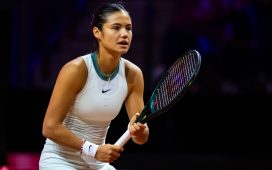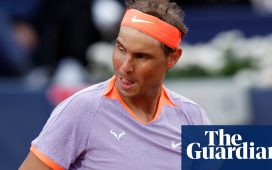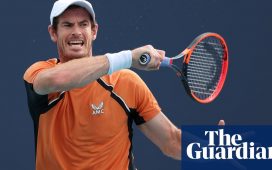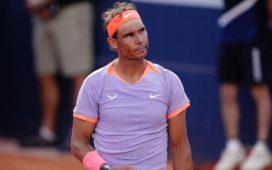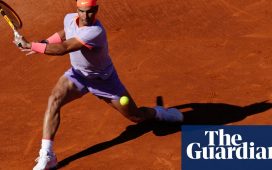After Peng Shuai and Andrea Sestini Hlaváčková won the doubles final at the 2014 Beijing Open, they went to karaoke to celebrate. The fifth-seeded duo had just beaten India’s Sania Mirza and Zimbabwe’s Cara Black, who had never lost a match in the Asia-Pacific region.
“She was at the beginning of her comeback and I was happy to be there to play with her,” Hlaváčková recalls, on the phone from Rome. Their victory called for a night out so they went to a big Beijing nightclub. “She was singing a lot of Chinese songs.”
The tournament was their second together and Peng was ecstatic. The Chinese crowds had turned out in droves to watch their “superstar” player. For Hlaváčková it had been an eye-opening experience of the production scale of Chinese sport.
“[Peng] always had someone helping her – a physio, a coach, a pairing partner. That to me was Chinese tennis: a lot of people helping, and everyone working hard. So hard.”
Throughout much of it, Peng was also, allegedly, keeping a very big secret.
On 2 November this year she finally decided to reveal it. In a Weibo post that was quickly deleted, Peng accused China’s former vice-premier Zhang Gaoli of sexually assaulting her in his home, with his wife and at least one other person also in the house.
In a lengthy and emotional post, Peng claimed the pair had sustained a long but intermittent relationship, which had paused while he served as one of China’s most powerful officials and refused to contact her. According to Peng, he reached out after his retirement, contacting her through a doctor at the Tianjin sports centre where she once trained, and invited her to play tennis with him and his wife. The doctor did not respond to a request for comment.

Peng alleged he coerced her into sex, and later, with “complicated” feelings, they rekindled the affair. Then in late October this year the pair argued and Zhang failed to meet her for a talk, appearing to prompt her Weibo post.
The details of the saga have been widely shared and reported outside China, but during the time she alleges she was in a relationship with Zhang, few – if any – others knew of it.
“She was a very private person and there was not much we all knew about her, we just knew how good of a tennis player she was,” says Hlaváčková.
“Nobody had any clue. She must have been really decisive to put it out there, because to put it out there in China is very difficult.”
Born in Xiangtan, Hunan province, in 1986, Peng began playing at the age of eight with her uncle. She was sent to the state training centre in Tianjin at 12, where she would later meet Zhang when he was party secretary. By her late 20s she was a tennis celebrity, one who had pushed herself through the rigours of reaching an elite level among 1.4 billion people, battling injuries and multiple heart surgeries. She was lauded by state media with terms of endearment such as “golden flower” and “Chinese princess”.
“We are all members of China’s glorious age of tennis,” she told state media earlier this year. “Leaving our different footprints in such a short lifetime is not representing the glory of one single Chinese player, but a decade of development for tennis in China, step by step.”
But the fame and adoration was not enough to protect her when she made her allegations against Zhang.
The case is the highest profile of any #MeToo case in China. Never before has a senior Communist party official, let alone one as high-ranking as Zhang, been accused by someone as part of the movement. China’s male-dominated government has made pledges and legal changes designed to address violence and harassment against women, but in practice cases have failed in court and women’s rights groups have been targeted in state crackdowns. Online groups have been closed, accounts censored or shut down, and figures such as the lawyer Huang Xueqin and activist Wang Jianbing disappeared.
Peng’s post was live for about 30 minutes before it was taken down and all references to it and Peng were censored. Almost four weeks on it remains near impossible to comment or post online about the player.
A prominent feminist activist inside China, who asked to remain anonymous, says it was the most powerful example of censorship against the #MeToo movement seen so far, making it almost – but not quite – impossible to discuss.
“It prevented the topic from spreading after that night, but the censorship system couldn’t prevent people who already knew and believed in Peng Shuai from continuing to care about it,” she says.
“I think after this incident, #MeToo may undergo more stringent review and questioning. But #MeToo will never stop, because this has never been a campaign planned by men.”
For a while, there were fears Peng, who was not seen for about three weeks after her post, had disappeared like Huang and Wang. An international campaign built around her, led by the Women’s Tennis Association, calling for an investigation into her accusations and proof she was safe, well, and free. Eventually unable to ignore it, China’s state-run media issued ham-fisted “proof”, including videos and a purported email with language more closely resembling the forced confessions of dissidents than Peng’s emotional Weibo post.
The clips, and a subsequent video call with the International Olympic Committee president, Thomas Bach, who said she was fine and did not address the allegations, only made observers more worried that she was under some form of state coercion.
Natasha Kassam, a China expert with the Australian thinktank the Lowy Institute, says the censorship “makes it clear Peng is not able to speak for herself freely”.
“It was very clear in the early days that the party state did not have a credible narrative with which to counter both Peng’s claims and then her disappearance,” says Kassam.
Hlaváčková, who has retired from tennis, says she has been pleased with the advocacy of the WTA (which her partner also works for), and is following the industry’s broader debate over the balance of ethics and commerce with China.
“I’m just happily confirmed that we are on the same page when it comes to women’s rights,” she says.
“Until it’s really touching your sport, which right now it is, you do your business there and they do a great job of organising tournaments … But now it’s touching one of our players and we are very happy that business comes second.”
The anonymous activist believes Peng is and will be physically safe, but that does not mean she is not in pain.
“We don’t just want Peng Shuai to be safe, we also hope that she will no longer be suffering as much as she described.”



